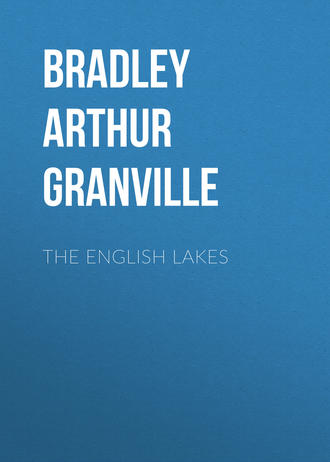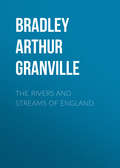
Bradley Arthur Granville
The English Lakes
KIRKSTONE AND ULLSWATER
Kirkstone Pass looms always large in one's Lakeland memories. For one thing, it is the ladder over which all traffic laboriously climbs from the comparatively populous shores of Windermere into the long sequestered trough of Ullswater, while for the walker it links the eastern block of mountains to the Helvellyn and central group. It is, I think, the highest road pass in England, touching the line of 1500 feet where a lonely inn claims, by a natural inference, the uncomfortable distinction of being the highest habitation in the kingdom. But whatever may be the measure of its winter solitude, the cheery turmoil of the shepherds' meeting in November, attended by some three hundred more or less interested persons, must put heart into its occupants for the ordeal. For on that great day, crowned by a gargantuan feast, the stray sheep that have wandered from their rightful ranges and mingled with a neighbouring flock are handed over, accompanied by ceremonies of immemorial use. Then, too, a hundred or so of collie dogs settle such disputes among themselves as may be of old standing, or more often perhaps excited thereto by such unparalleled opportunities. A hound trail usually completes the long day which begins betimes, for every man upon these mountains is an enthusiast on the chase in its literal sense, and knows as much of hounds and foxes as many an M.F.H. elsewhere.
The steep descent into the narrow, verdant, stone-walled, thinly peopled floor of the head of Patterdale, with its sprinkling of little white-washed, scyamore-shaded homesteads, is not a theme for words but for the brush; above all for the eye itself. Caudale Moor and Hartshope Dodd loom largest above our right shoulder, shutting out the lofty solitudes behind, while on the left Redscrees, Raven Crag, and Harts Crag, and a fine confusion of rugged summits culminate in Helvellyn, which upon this eastern side shows its nobler and precipitous front. Brotherswater, though but a quarter of a mile in diameter, fills the vale, and like a jewel catches every humour of these ever-restless skies; gleaming betimes like molten gold, or on windless noons reflecting the greys and greens of the overhanging steeps so vividly on its glassy surface as almost to efface itself in its own shadows; at other times, torn by the tempests that pour down from Kirkstone, into a sheet of seething foam. For it is incredible to what a fury even a little lake like this can lash itself, when exposed to the concentrated volleys of two or three mountain glens.
The memory of one of these spectacles on Hayswater, but a mile or so distant, is suggested by the little hamlet of Low Hartsop at the mouth of a lateral glen that comes in just where the valley widens somewhat, bringing with it Hayswater beck to join the Goldrill, which last has run through Brotherswater. Hartsop Hall is a plain, rugged old manor house overhung with trees on the Kirkstone shore of the lake, long the abode of sheep farmers, but possessed of the inconvenient disability of a public right-of-way through the centre, now presumably lapsed.
But till a few years ago a venerable champion of popular rights, or perhaps merely a humorist with plenty of spare time, used to make an annual pilgrimage here, and walk in at the front door and out at the back without any ceremony.
Low Hartshope itself is a group of some half-dozen mellow and mossy homesteads, planted irregularly above the beck at any time within the last five centuries. Fine old trees of sycamore, ash, and oak spread a protecting mantle of foliage over this snug and ancient haunt of dalesmen – a little patch of leafy opulence between the stern walls of fell that rise sharply on either hand. One or two houses of the group, representing, one might fancy, the proportionate decline of population in the dales, are falling or have long ago fallen into ruins. Moss and ferns, stone-crop and saxifrage, have seized alike upon both the abandoned and the fallen, upon the sagging flagstone roof which covers neither more nor less of the exposed weather-stained oak rafters than it did ten years ago, upon the fallen stones of a more completed ruin slowly sinking into the ground. Here may be seen, too, the deep, oldfashioned spinning galleries thrust out from the upper story and covered by an extension of the roof, invaluable not merely for the summer air, but for the lack of winter daylight in those massive, low-browed, small-windowed fortresses where the thrifty dalesmen dwelt. Wordsworth has celebrated a pretty old tradition that the spindles ran truer after the sheep had mounted the hill for their night's rest.
Now beneath the starry sky
Crouch the widely scattered sheep,
Ply the pleasant labour, ply,
For the spindle while they sleep
Runs with motion smooth and fine,
Gathering up a trustier line.
A mile or so up the glen, the higher part a steep climb, down which a beck comes leaping in successive cataracts over black rocks feathered with fern and rowan trees, lies entrenched between mountain walls which rise some fifteen hundred feet above its three sides, the lonely lake of Hayswater. Scarce a mile in length and narrow in proportion, the scene is one in fair weather of delightful and impressive solitude, in wild weather awesome to a degree bordering on the uncanny. The mountain ridges all round are grey, stern, and rugged, while their green, rock-strewn lower slopes fall for the most part sharply to the water's edge. There is nowhere even a suggestion of humanity, but a rude boat half full of water chained to a rock. So lonely a sheet of water of this size, and thus nobly encompassed about and shut off from the world, there is not in all Lakeland. On a tempestuous May day some two years since the writer, underrating the measure of ferocity that the extra elevation of a thousand feet adds to a storm, found himself a solitary angler, beside these gloomy shores, amid as fine a prospect of the kind as the somberer side of one's soul might wish for. The south-west gale had found its way over the screes of the High Street ridge that closes the head of the narrow valley of which Kidsty and Grey Crag form the sides. Enraged apparently by opposition, it was coming down the full length of the lake in intermittent bursts of rain-laden fury that made even keeping one's feet no simple matter, and life altogether for the moment a moderate sort of entertainment. The fact that in the brief pauses, while the storm drew fresh breath, I could just keep my flies on the water in the shelter of rocky points, and at the same time not unprofitably, must be quoted in explanation of what might otherwise seem a quite superfluous attendance at such a dismal pandemonium of the elements. But these fortuitous encounters with nature in her most savage mood, and in her grimmest haunts, are among the memories that for myself I would ill spare, and none the less so because they so often belong to the unexpected and the unsought.
The upper and more rugged half of the valley walls on this sombre occasion opened and shut in veils of scudding mist, while their steep green flanks, littered with black crags fallen in long ages past from above, made a fitting frame for the white hissing waters that filled the long and stormy trough. But the crowning feature of this particular scene was at the foot of the lake, where it draws to a narrow point between high rocky banks, and the out-going beck leaps towards the gorge below through a gap in a stone dyke which otherwise closes the entrance. For into this funnel the storm seemed to concentrate its fury, lashing the waters after the fashion of a helm wind high into the air, and hurling them far down into the ravine below.
But I do not wish to keep the reader out in the wind and rain for the whole of our sojourn in Patterdale, and I should be an ingrate indeed to do so, for in many visits to this delightful haven in the Lake country I am only too rejoiced to remember that sunshine has far outbalanced cloud. And under such conditions the three miles of verdant vale from Hartsop to Ullswater, by way of the hamlet and church of Patterdale (named from St. Patrick) to Glenridding on the lake shore, is as characteristic and charming a pastoral valley as there is in all the Lake country. Cottages and homesteads, with their sheltering tufts of foliage, have still even this much-visited country almost to themselves, as they had it a century ago. The Goldrill, now a lusty stream, curves and sparkles from farm to farm. The bordering fields terminate in pleasant strips of woodland, or in bosky knolls of fern and rock, while far above upon either side rise steep and high the everlasting hills. And crowding round the head of Ullswater, which now spreads wide its bright island-studded waters and ends the vale, are mountains piled up everywhere. Place Fell and Birk Fell, lifting their untamed steeps of crag and scree sheer up from the water along four miles of the eastern shore, give that exceptional touch of wildness to the great lake which, together with the fine grouping of Helvellyn and her satellites upon the other side, justifies in the opinion of many its claim to pre-eminence among its sisters. For myself, I frankly admit that the head of Ullswater, and, for choice, a lodgment upon the Glenridding shore near the edge of the lake, holds me more tenaciously when I get there than any part of Lakeland.
There was once a king in Patterdale. His name was Mounsey, and he died in 1792, and the Gentleman's Magazine for that year in its obituary tells us all about him, facts confirmed, if such were necessary, by local tradition. This was in the days of the "statesmen", before outsiders came in and bought property and broke in upon the old Lakeland democracy. Patterdale Hall has now this long time been a large country house with a large estate attached to it. In the modest original homestead, however, reigned the Mounseys, who from time immemorial had been regarded as "kings" of the dale before the reign of the undesirable and eccentric monarch who proved to be the last but one of them.
This John Mounsey had an income of ₤800 a year, and the chief efforts of his life, which lasted over ninety years, were directed to keeping his expenses down to £30. In short, he was a miser of the most unabashed type. He was endowed with immense physical strength, of which, unlike his money, he grudged no expenditure in the pursuit of the over-mastering passion of his life. He rowed his own slate and timber down the lake to market, and toiled all day at the hardest manual tasks. When compelled to visit Penrith or elsewhere on business, he slept in neighbouring barns to save a hotel bill. He had his stockings shod with leather, and always wore wooden shoes. He is reported on one occasion, while riding by the lake, to have dismounted, stripped, and dived into it after an old stocking that caught his eye. Rather than buy a respectable suit for funerals, markets, and the like, he used to force the loan of them from his tenants, who were also under agreement to furnish him with so many free meals a year. Ever fearful of being robbed, he used to secrete his money in walls and holes in the ground, a practice which occasioned many exhilarating hunts for treasure-trove among the idle. His last luxury was putting out to the lowest tender the drawing of his will. The Patterdale schoolmaster, with a bid of ten-pence, obtained the contract. His son, however, closed the dynasty with honour, when the forbear of the present owner bought the royal domain and a good deal more beside, and planted those beautiful wild woods along the western margin of Ullswater that are the delight of every visitor, and above all of those for whom mountain and lake offer too strenuous adventure.
Various glens of infinite beauty wind up to the heart and shoulders of Helvellyn and Fairfield, which mountains display to the people of Ullswater by far their finest qualities. Across the lake a fine solitude of moor and fell, rising to 2600 feet, spreads far away eastward to Shap, including Martindale, Boredale, Mardale, and the High Street range, which carries the old Roman road to Carlisle (whence comes its name, Ystrad) along its summit. The wild red deer still roam over this wilderness as far as the shores of Ullswater, while as regards foxes they are almost too plentiful everywhere. Nor is there any part of England, no not Leicestershire, though in far different fashion, where they fill a bigger place in the public eye. Of the four or five packs of foxhounds hunted and followed on foot over the fells of Lakeland, one kennelled at Ullswater is among the most notable, if only for its famous huntsman. Every soul in Lakeland as far east as Crossfell, and every frequenter of Ullswater, knows "Joe Bowman", who has just now completed thirty years of such severe service as hunting a pack of fell hounds on foot means. The mantle of John Peel (who hunted a lower country, however, and rode to his hounds) has almost fallen upon him. His stalwart form may even be seen, like that of John Peel's, outside the cover of hunting songs in the windows of Carlisle music shops. If the songs are not sung like the others round the world, the memory of their subject will live among the dalesmen, I'll warrant, to their children's children. For hunting here is actually, not theoretically, democratic. When hounds throw off soon after daylight on a mountain side, and hunt a slow drag for an hour or two till they move their fox, and the field have to follow on foot as best they may, there is not much scope for the dashing and the decorative side of the chase. The fell farmers are all devoted followers, are on familiar terms with all the foxes, their domestic arrangements, and their families, and their probable line of action when pursued. They mostly know the hounds, and can recall their fathers and their mothers and their grandparents, and are steeped in hound lore. The very children about the head of Ullswater know many of the "dogs" personally, and have played with them as puppies. For they are mostly "walked" on the surrounding farms in summer, and when they play truant, which is pretty often, and come trotting through the village after a hunt upon their own account, it is quaint to hear them affectionately invoked by name from window or doorstep as familiar public characters. The necessity for keeping down the foxes gives, of course, an extra zest to the chase in these mountains. There being nothing to prevent and much to stimulate it in this country of late lambs, hunting is carried on vigorously till the middle of May; April, as a matter of fact, being for many reasons irrelevant here the most active month, and the best for seeing the sport. It is glorious, indeed, on an early spring morning to be perched, let us say, on one of the lower shoulders of Helvellyn, with the joyous crash of hounds upon a warming scent echoing from cliff to cliff.




